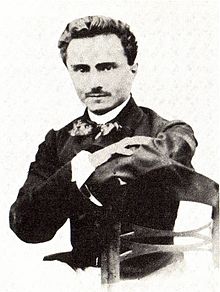Ippolito Nievo

Ippolito Nievo (Italian pronunciation: [ipˈpɔːlito ˈnjɛːvo]; 30 November 1831 – 4 March 1861) was an Italian writer, journalist and patriot. His Confessions of an Italian is widely considered the most important novel about the Italian Risorgimento.
Life
Nievo was born and raised in Padua, during the time the Veneto region was ruled by the Austrian Empire. His father was a lawyer. Nievo studied law at the University of Padua, but upon graduating, he refused to join his father's profession as it would imply submission to the Austrian government. He was politically inspired by Giuseppe Mazzini's thought and wanted to join the struggle for the independence of Veneto and a united Italy. In 1860 he fought with Giuseppe Garibaldi's Expedition of the Thousand, who, after having defeated the Bourbon army in Sicily and Southern Italy, gave those regions to the King of Sardinia Victor Emmanuel II. On 18 February 1861, in fulfilment of Nievo's hopes, Italy was unified under the House of Savoy. Shortly afterwards, in March, Nievo died in a shipwreck in the Tyrrhenian Sea.
Confessions of an Italian
Nievo is best known for his novel Confessions of an Italian, tr. from the Italian by Frederika Randall, introduction by Lucy Riall, Penguin, London, 2014; an abridged English translation appeared under the title The Castle of Fratta in 1957. Written between December 1857 and August 1858, the work is in twenty-three chapters. Nievo died before it could receive its final editing. Nievo himself did not find a publisher, and it was only in 1867, six years after the writer's death, that the novel was published under the title Confessioni di un ottuagenario (Confessions of an octogenarian). The author's original title, by which the book is now generally known, was Le Confessioni d'un italiano, but this seemed to be too "political" for the times.
The novel is both historical (its background is events in Italy in the last decades of the 18th century and the first half of the 19th century) and psychological, being based upon the memories of "Carlo Altoviti", the main character and first-person narrator. It is widely considered the most important novel about the Italian Risorgimento.
Other works
Nievo wrote also poetry (Versi, 1854–55), short stories, mainly set in the countryside of Friuli, the region where Nievo lived as a young boy, and novels (Il conte pecoraio, Angelo di bontà, Il barone di Nicastro).
His political engagement was reflected in two essays: Venezia e la libertà d'Italia (1860) and Frammento sulla rivoluzione nazionale (published 1929).
References
- Chamber's Encyclopedia Volume 10 page 35
- Giulio Ferroni, Profilo storico della letteratura italiana, Einaudi scuola, Milan, 1992
External links
